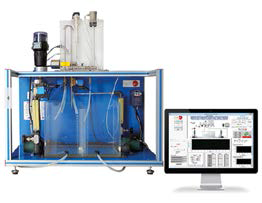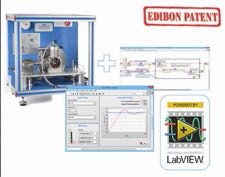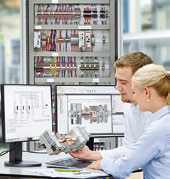“Both LabVIEW and the RIO family have been helpful in creating control applications that are more than 60% reusable for other developments, as well as reducing solution and integration costs by up to 30%.”
– Cesar Bonilla, EDIBON
The challenge
Train the new generations in the area of Process Control engineering, both in the study of its principles and in the latest techniques and technologies applied at an industrial level.
The solution
Three modular systems have been developed in the field of process control applications for the study of measurement systems and control algorithms, the adjustment and testing of industrial controllers through Hardware in the Loop simulation and the analysis of real systems such as control plants. of industrial processes through an architecture based on LabVIEW with deterministic control hardware. EDIBON is specialized in the development of technical didactic equipment for training in various areas such as Energy, Thermodynamics, Process Control, Chemical Engineering, Environment, among others. In the field of Process Control, it addresses various branches of study, such as Process Control Applications, Process Control of Industrial Systems, Controllers, etc. Due to the increasing automation of industrial processes, increasingly complex control and supervision applications are being developed in Industries such as Energy, Agri-food, Automotive...
For this reason, updated and adapted technical training is necessary that allows both technicians and engineers to understand the fundamental principles on which these applications are based in order to successfully address new solutions and improvements to them. In the Process Control Applications branch, the UMCP unit stands out, which is oriented to the study of measurement sensors and instrumentation as well as control strategies and algorithms used in industrial applications for the control of variables such as level, temperature, flow, pressure , pH, etc. Therefore, control applications in LabVIEW REAL TIME have been developed in an embedded device, myRIO, that allow the implementation of systems for the acquisition and conditioning of sensor and transducer signals (thermocouples, piezoresistive, capacitive, etc.) as well as the control of actuators (pumps, solenoid valves, heating resistors, etc.) by means of control algorithms such as PID, all/nothing, feedforward, adaptive predictive, fuzzy logic, cascade control...
In the Industrial Systems Process Control area, the CPIC stands out, a full-scale system of an industrial process control plant that integrates all elements commonly used in the industry such as water tanks, pressurized tanks, pneumatic valves, analog sensors and digital devices, pumps, etc., accompanied by high-performance SCADA software. A CompactRIO architecture is recommended here because it is more industrial, integrated by both analog and digital input/output modules (NI 9209, NI 9263 and NI 9403) together with LabVIEW REAL TIME and LabVIEW FPGA in the development of a SCADA system for control. and monitoring of process variables, implementation of optimized algorithms, event recording, alarms... (Figure 2). Finally, in the Controllers branch, the CEAC unit stands out, which implements one of the latest techniques for testing and adjusting industrial controllers, which consists of simulating the process to be controlled in a Hardware system, also known as Hardware in the loop (HIL).
All this is carried out thanks to the development of a SCADA application implemented in LabVIEW REAL TIME, which not only performs acquisition and control but also simulates systems of different industrial processes in real time on a myRIO device.(Figure 3). All developments are accompanied by two complementary software packages, ICAI and ELK. The first is an Interactive Computer Aided Teaching Software with which you can carry out practical exercises and tests with the equipment, evaluate the users, obtain statistical results of their evolution, etc. The second is a Software Development Kit that allows getting started in LabVIEW in a practical way, accessing the source code and implementing control algorithms based on the Model-Based Design (MBD) methodology by modeling and simulating the systems to be controlled.







